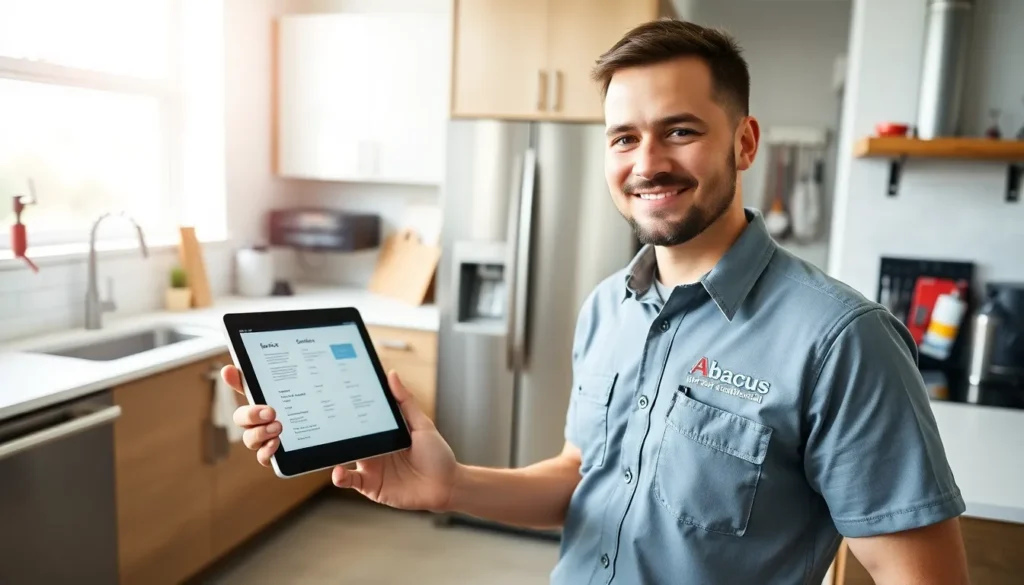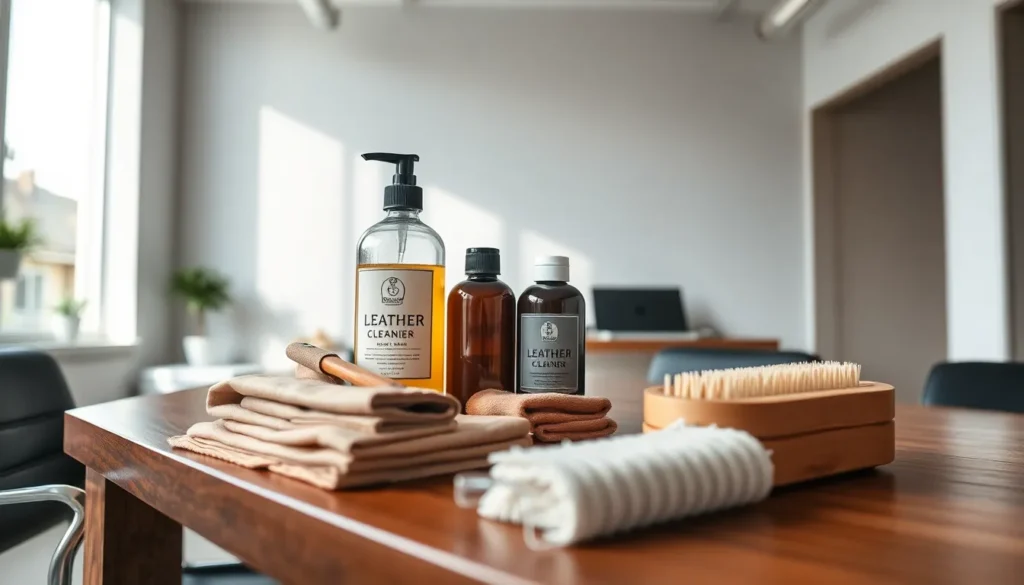Cleaning routines might not be the most thrilling topic, but they can transform chaos into calm. Imagine a world where dust bunnies don’t hold meetings in the corners of your living room and where your socks actually find their way back to the drawer. With a little planning and a dash of humor, keeping a clean space can feel less like a chore and more like a mini-adventure.
Picture this: you wake up to a sparkling kitchen, the scent of fresh lemon wafting through the air, and you can finally see the countertop—what a revelation! A well-structured cleaning routine not only saves time but also boosts productivity and lifts your mood. So, roll up those sleeves and grab that mop; it’s time to discover how a few simple habits can turn cleaning from a dreaded task into a satisfying ritual.
Table of Contents
ToggleImportance Of Cleaning Routines
Cleaning routines significantly impact mental and physical well-being. A consistent cleaning schedule minimizes clutter, which leads to reduced stress levels and enhanced focus. People often experience increased productivity in organized spaces, fostering a positive mindset and creativity.
Effective cleaning routines also promote better health. Regularly cleaning surfaces decreases allergens, bacteria, and dust accumulation. Maintained cleanliness in high-traffic areas, such as kitchens and bathrooms, cuts down the spread of germs, promoting a healthier living environment.
In addition, establishing a cleaning routine develops good habits. Tasks like organizing, dusting, and vacuuming become part of daily life, requiring less effort and time over time. Adopting a systematic approach to cleaning allows individuals to maintain their space efficiently, reducing the pressure of last-minute cleaning before guests arrive.
Moreover, engaging in cleaning routines cultivates a sense of accomplishment. Completing tasks provides immediate gratification, which can uplift mood and motivate individuals to tackle other responsibilities. Building on these small victories fosters a cycle of productivity, where the clean environment encourages further organization and planning.
Cleaning routines not only create a welcoming environment but also enhance overall well-being. They offer practical health benefits, encourage positive habits, and contribute to a more organized lifestyle. Prioritizing these routines proves essential for maintaining physical spaces and individual mental clarity.
Types Of Cleaning Routines

Cleaning routines vary based on frequency and task complexity. Each type addresses specific needs, contributing to an organized and healthy space.
Daily Cleaning Tasks
Daily tasks focus on maintaining cleanliness in high-traffic areas. These tasks include making beds, washing dishes, and wiping down surfaces. Quick sweeps of floors remove dirt and debris, while organizing clutter prevents accumulation. Establishing a daily cleaning routine helps individuals start the day in a tidy environment. Short time commitments each day reduce the need for extensive clean-up later.
Weekly Cleaning Tasks
Weekly routines involve more thorough cleaning to maintain a healthy home. Tasks in this category might include vacuuming, mopping floors, and dusting furniture. Cleaning bathrooms and kitchens can prevent the buildup of grime and bacteria. Setting aside specific days for these tasks ensures comprehensive upkeep. Consistency in weekly cleaning fosters a more inviting and functional living space.
Monthly Cleaning Tasks
Monthly cleaning tasks target less frequently addressed areas. These tasks often include washing windows, deep cleaning appliances, and organizing closets. Regularly assessing hidden spaces like under furniture can reduce allergens. Creating a monthly checklist provides structure and accountability. Addressing these tasks ensures an overall clean and fresh environment throughout the home.
Tips For Effective Cleaning Routines
Effective cleaning routines enhance productivity and promote a healthy living environment. Two important aspects include time management and using the right tools.
Time Management
Effective cleaning doesn’t require hours of effort. Breaking tasks into shorter segments makes them more manageable. Rather than dedicating an entire day to cleaning, individuals can allocate 15-30 minutes daily to one or two tasks. This approach prevents overwhelm and encourages consistency. Integrating cleaning into daily activities simplifies the process. For instance, tidying a small area while waiting for the coffee to brew keeps spaces orderly. Scheduling cleaning sessions in a planner provides structure and accountability. Balancing cleaning with other responsibilities ensures that it doesn’t consume too much time.
Using The Right Tools
Selecting the right cleaning tools enhances efficiency and effectiveness. Essential items include microfiber cloths, vacuum cleaners, and disinfectant sprays. Each tool serves a specific purpose, making tasks easier and quicker. Microfiber cloths capture dust and debris without scratching surfaces. Vacuum cleaners with HEPA filters help eliminate allergens, ensuring cleaner air. Disinfectant sprays kill germs and bacteria, promoting a healthier environment. Investing in versatile tools, like multi-surface cleaners, reduces clutter and simplifies cleaning routines. Organizing cleaning supplies in a designated caddy or storage space makes them easily accessible.
Challenges In Maintaining Cleaning Routines
Maintaining cleaning routines presents several challenges. Various factors can disrupt consistency and effectiveness.
Common Obstacles
Busy schedules often lead to skipped cleaning sessions. Distractions, like phone notifications and household activities, divert attention from tasks. Overwhelm can arise from the perception of extensive chores, making it easy to postpone cleaning. Lack of motivation affects engagement, causing routines to fall by the wayside. Additionally, inadequate planning may result in unclear priorities, further complicating efforts. Each obstacle contributes to a cycle that discourages maintaining cleaning habits.
Solutions To Overcome Challenges
Establishing a concrete schedule serves as a foundation for success. Allocating specific times for daily, weekly, or monthly tasks creates structure. Utilizing timers can make cleaning sessions feel manageable; setting 15-30 minutes enhances focus. Finding enjoyable cleaning methods, such as upbeat music or podcasts, can boost motivation. Simplifying cleaning supplies and ensuring accessibility also streamlines efforts. Breaking tasks into smaller, achievable segments prevents feelings of overwhelm, fostering a consistent routine. By implementing these strategies, individuals can effectively address challenges and maintain organization.
Embracing a cleaning routine can significantly enhance both living spaces and personal well-being. By incorporating daily, weekly, and monthly tasks into their schedules, individuals can maintain an organized and healthy environment. This approach not only minimizes clutter but also fosters a sense of accomplishment.
Overcoming common challenges in cleaning can lead to a more enjoyable experience. With the right tools and strategies in place, cleaning transforms from a mundane chore into a fulfilling ritual. Ultimately, prioritizing these routines contributes to a more peaceful and productive life, allowing individuals to thrive in their homes.









